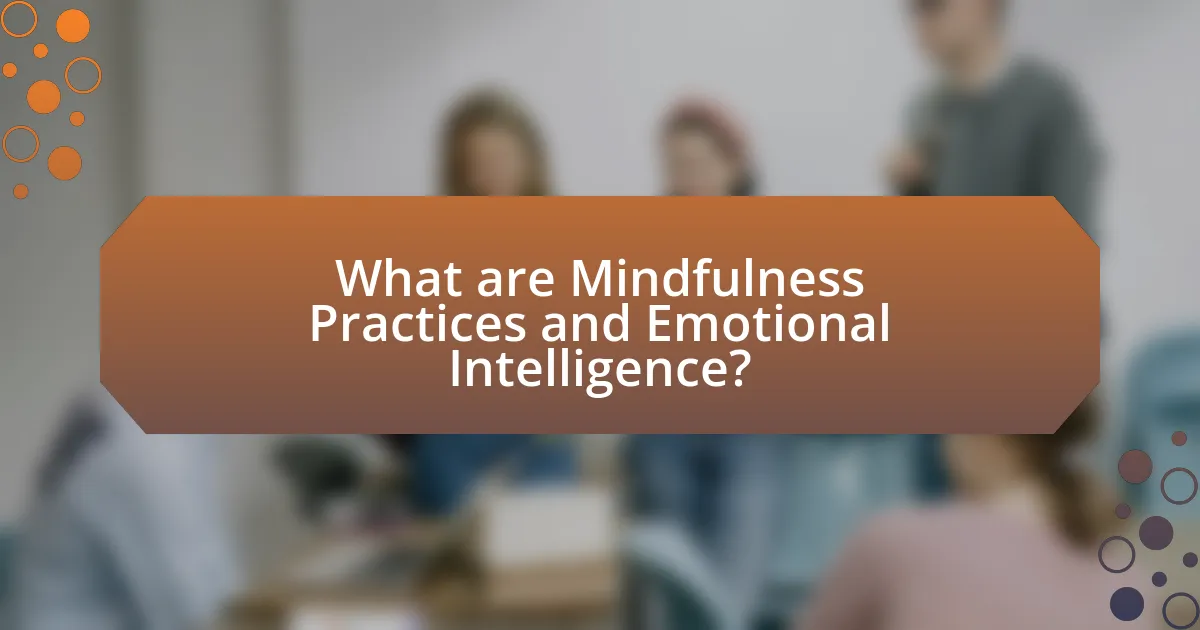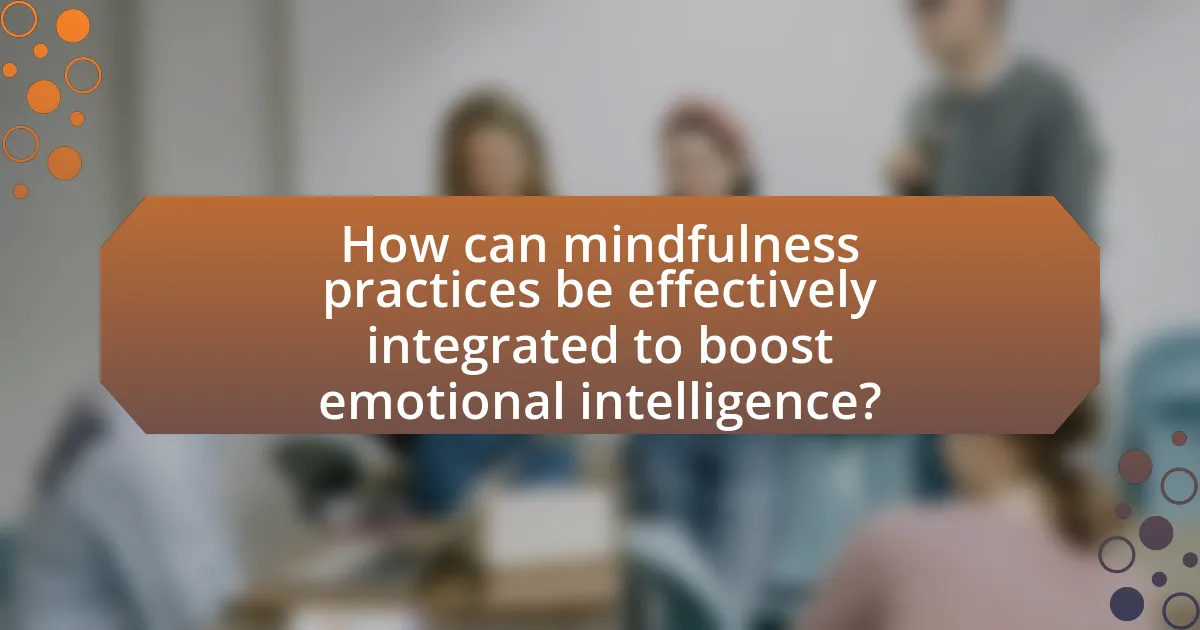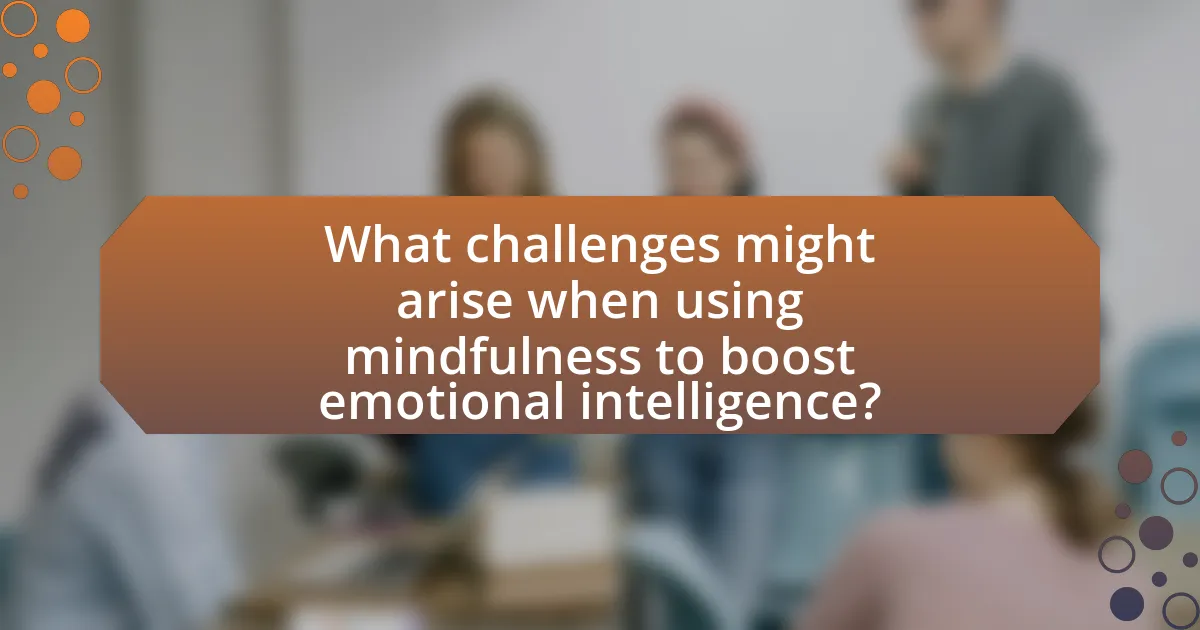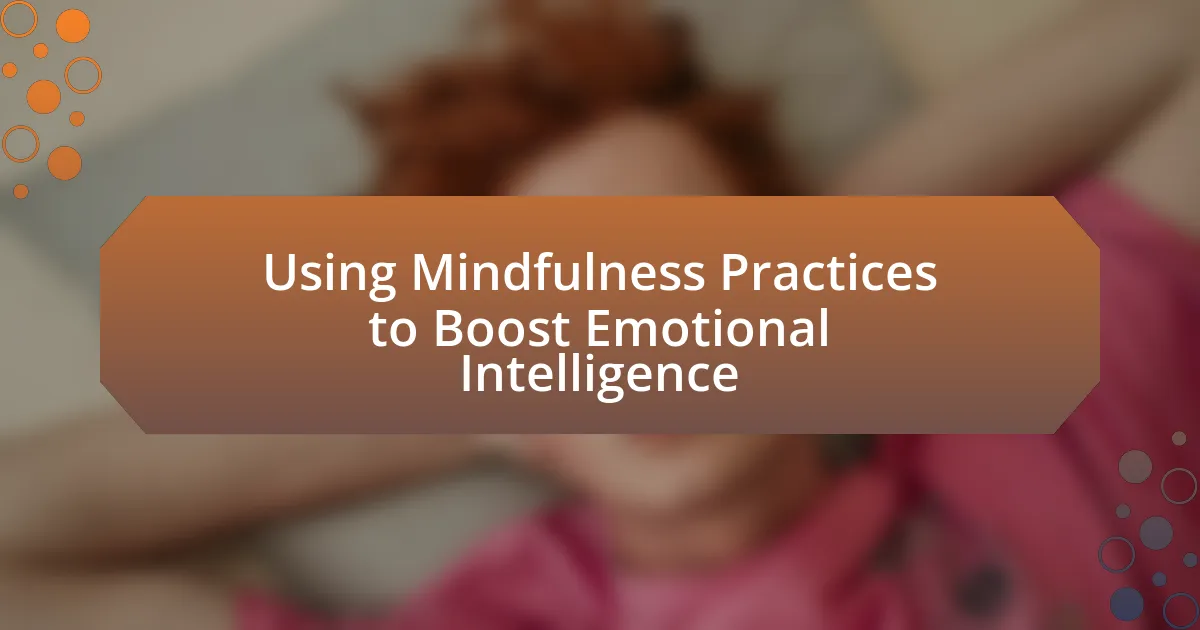Mindfulness practices, including meditation, breathing exercises, and mindful observation, are techniques designed to enhance focused awareness on the present moment. These practices significantly contribute to emotional intelligence by fostering self-awareness, self-regulation, and empathy. Research indicates that individuals who engage in mindfulness demonstrate improved emotional regulation and interpersonal skills, leading to better communication and relationships. The article explores the relationship between mindfulness and emotional intelligence, detailing specific techniques that enhance emotional awareness, the benefits of emotional intelligence in personal and professional contexts, and practical strategies for integrating mindfulness into daily routines to boost emotional intelligence effectively.

What are Mindfulness Practices and Emotional Intelligence?
Mindfulness practices are techniques that promote focused awareness on the present moment, often through meditation, breathing exercises, or mindful observation. These practices enhance emotional intelligence by fostering self-awareness, self-regulation, and empathy, which are key components of emotional intelligence. Research indicates that individuals who engage in mindfulness practices demonstrate improved emotional regulation and interpersonal skills, as evidenced by studies showing that mindfulness training can lead to significant increases in emotional intelligence scores.
How do mindfulness practices relate to emotional intelligence?
Mindfulness practices enhance emotional intelligence by fostering self-awareness and emotional regulation. Engaging in mindfulness allows individuals to observe their thoughts and feelings without judgment, which is crucial for recognizing emotional triggers and responses. Research indicates that mindfulness training can lead to significant improvements in emotional regulation skills, as evidenced by a study published in the journal “Emotion” by Keng, Smoski, and Robins, which found that participants who practiced mindfulness reported higher levels of emotional awareness and better management of their emotions. This connection between mindfulness and emotional intelligence underscores the importance of mindfulness as a tool for personal development and emotional growth.
What specific mindfulness techniques enhance emotional awareness?
Mindfulness techniques that enhance emotional awareness include body scanning, mindful breathing, and journaling. Body scanning involves focusing attention on different parts of the body to identify physical sensations and emotional responses, which helps individuals connect with their feelings. Mindful breathing encourages awareness of the breath, allowing individuals to observe their thoughts and emotions without judgment, fostering a deeper understanding of their emotional state. Journaling promotes reflection on daily experiences and emotions, enabling individuals to articulate and process their feelings more effectively. Research indicates that these techniques can significantly improve emotional regulation and awareness, as evidenced by studies showing increased emotional intelligence in participants who practice mindfulness regularly.
How does emotional intelligence benefit from mindfulness practices?
Mindfulness practices enhance emotional intelligence by improving self-awareness, emotional regulation, and empathy. Engaging in mindfulness allows individuals to observe their thoughts and feelings without judgment, leading to greater understanding of their emotional states. Research indicates that mindfulness training can significantly increase emotional regulation skills, as evidenced by a study published in the journal “Emotion” by Keng, Smoski, and Robins, which found that participants who practiced mindfulness reported better emotional control and reduced emotional reactivity. Additionally, mindfulness fosters empathy by encouraging individuals to be present and attentive to others’ emotions, thereby strengthening interpersonal relationships and social awareness.
Why is emotional intelligence important in personal and professional life?
Emotional intelligence is crucial in personal and professional life because it enhances interpersonal relationships and decision-making abilities. Individuals with high emotional intelligence can recognize and manage their own emotions while empathizing with others, leading to improved communication and collaboration. Research indicates that emotional intelligence contributes to better leadership, as leaders with high emotional intelligence are more effective in motivating and inspiring their teams. A study published in the Journal of Organizational Behavior found that emotional intelligence is linked to job performance, with a correlation coefficient of 0.36, demonstrating its significance in workplace success.
What role does emotional intelligence play in effective communication?
Emotional intelligence significantly enhances effective communication by enabling individuals to understand and manage their own emotions while also recognizing and influencing the emotions of others. This understanding fosters empathy, which is crucial for building rapport and trust in conversations. Research indicates that individuals with high emotional intelligence are better at interpreting non-verbal cues and responding appropriately, leading to clearer and more constructive interactions. For instance, a study published in the Journal of Applied Psychology found that emotional intelligence is positively correlated with communication skills, suggesting that those who can navigate their emotions effectively are more adept at conveying their thoughts and feelings in a way that resonates with others.
How can emotional intelligence improve relationships?
Emotional intelligence can improve relationships by enhancing communication, empathy, and conflict resolution skills. Individuals with high emotional intelligence are better at recognizing their own emotions and the emotions of others, which fosters deeper connections and understanding. Research indicates that emotionally intelligent individuals are more adept at managing interpersonal dynamics, leading to healthier and more satisfying relationships. For instance, a study published in the Journal of Personality and Social Psychology found that individuals with higher emotional intelligence reported greater relationship satisfaction and were more effective in resolving conflicts. This ability to navigate emotional landscapes contributes to stronger, more resilient relationships.

How can mindfulness practices be effectively integrated to boost emotional intelligence?
Mindfulness practices can be effectively integrated to boost emotional intelligence by enhancing self-awareness, self-regulation, and empathy. Engaging in mindfulness meditation, for instance, allows individuals to observe their thoughts and emotions without judgment, which fosters greater self-awareness. Research by Zeidan et al. (2010) published in the journal Consciousness and Cognition indicates that mindfulness meditation improves attention and emotional regulation, key components of emotional intelligence. Additionally, practices such as mindful listening and compassion meditation can cultivate empathy by encouraging individuals to connect with others’ feelings and perspectives, thereby enhancing interpersonal relationships.
What are the best mindfulness practices for enhancing emotional intelligence?
The best mindfulness practices for enhancing emotional intelligence include meditation, mindful breathing, and body scanning. Meditation fosters self-awareness by encouraging individuals to observe their thoughts and emotions without judgment, which is essential for recognizing emotional triggers. Mindful breathing helps regulate emotions by promoting calmness and focus, allowing individuals to respond rather than react to emotional situations. Body scanning increases awareness of physical sensations linked to emotions, facilitating a deeper understanding of emotional responses. Research indicates that these practices can significantly improve emotional regulation and empathy, key components of emotional intelligence. For instance, a study published in the journal “Emotion” found that mindfulness meditation enhances emotional regulation and increases empathy among participants.
How can meditation improve self-regulation and empathy?
Meditation can improve self-regulation and empathy by enhancing emotional awareness and reducing reactivity. Research indicates that mindfulness meditation increases activity in brain regions associated with self-control, such as the prefrontal cortex, which helps individuals manage their impulses and emotions more effectively. Additionally, studies show that regular meditation practice fosters greater empathy by promoting perspective-taking and emotional resonance with others, as evidenced by increased activation in the anterior insula and anterior cingulate cortex during empathetic responses. These neural changes contribute to improved emotional intelligence, allowing individuals to navigate social interactions with greater understanding and compassion.
What role does mindful breathing play in emotional awareness?
Mindful breathing enhances emotional awareness by promoting a state of present-moment focus, which allows individuals to recognize and process their emotions more effectively. This practice encourages individuals to observe their thoughts and feelings without judgment, facilitating a deeper understanding of emotional triggers and responses. Research indicates that mindful breathing can activate the parasympathetic nervous system, leading to reduced stress and increased emotional regulation, as evidenced by a study published in the journal “Emotion” by researchers at the University of California, Berkeley, which found that participants who engaged in mindful breathing reported greater emotional clarity and resilience.
How can one develop a consistent mindfulness practice?
To develop a consistent mindfulness practice, one should establish a daily routine that incorporates mindfulness exercises, such as meditation or mindful breathing, for a set duration, ideally starting with five to ten minutes each day. Research indicates that regular practice can lead to significant improvements in emotional regulation and overall well-being, as evidenced by a study published in the journal “Psychological Science,” which found that participants who engaged in mindfulness meditation showed enhanced emotional intelligence and reduced stress levels. By committing to this routine and gradually increasing the duration and complexity of the exercises, individuals can cultivate a deeper and more consistent mindfulness practice.
What are practical steps to incorporate mindfulness into daily routines?
To incorporate mindfulness into daily routines, individuals can practice focused breathing for a few minutes each day, which helps center attention and reduce stress. This can be done by setting aside time in the morning or during breaks to focus solely on the breath, allowing thoughts to come and go without attachment. Research indicates that regular mindfulness practice can enhance emotional regulation and increase self-awareness, which are key components of emotional intelligence. For example, a study published in the journal “Emotion” by Keng, Smoski, and Robins (2011) found that mindfulness practices significantly improve emotional regulation skills. Additionally, integrating mindfulness into daily activities, such as mindful eating or walking, can further reinforce these benefits by promoting present-moment awareness in everyday tasks.
How can journaling enhance mindfulness and emotional intelligence?
Journaling enhances mindfulness and emotional intelligence by providing a structured method for self-reflection and emotional processing. This practice encourages individuals to articulate their thoughts and feelings, which fosters greater awareness of their emotional states and reactions. Research indicates that expressive writing can lead to improved emotional regulation and increased self-awareness, both key components of emotional intelligence. A study published in the Journal of Clinical Psychology found that participants who engaged in regular journaling reported higher levels of emotional clarity and reduced anxiety, demonstrating the effectiveness of journaling in enhancing these skills.

What challenges might arise when using mindfulness to boost emotional intelligence?
Using mindfulness to boost emotional intelligence can present several challenges, including difficulty in maintaining consistent practice, resistance to emotional discomfort, and potential misinterpretation of mindfulness techniques. Consistency is crucial for effectiveness; research indicates that regular mindfulness practice enhances emotional regulation, but many individuals struggle to integrate it into their daily routines. Additionally, mindfulness often requires confronting uncomfortable emotions, which can lead to avoidance rather than engagement, hindering emotional growth. Furthermore, some individuals may misinterpret mindfulness as merely a relaxation technique, neglecting its deeper purpose of fostering awareness and emotional insight, which can limit its effectiveness in enhancing emotional intelligence.
What common obstacles do individuals face in practicing mindfulness?
Individuals commonly face distractions, difficulty in maintaining focus, and resistance to emotional discomfort when practicing mindfulness. Distractions can stem from external environments or internal thoughts, making it challenging to stay present. Difficulty in maintaining focus often arises from a busy mind, which can hinder the ability to engage fully in mindfulness exercises. Additionally, resistance to emotional discomfort occurs when individuals encounter unpleasant feelings during mindfulness, leading them to avoid or disengage from the practice. These obstacles are frequently reported in mindfulness studies, highlighting the need for strategies to overcome them for effective emotional intelligence development.
How can distractions hinder mindfulness practice?
Distractions can significantly hinder mindfulness practice by interrupting focus and reducing the ability to engage fully in the present moment. When individuals are distracted, their attention shifts away from the mindfulness techniques, such as breath awareness or body scanning, which are essential for cultivating emotional intelligence. Research indicates that even brief distractions can lead to a decrease in cognitive performance and emotional regulation, as highlighted in a study by Mark et al. (2018) published in the Journal of Experimental Psychology. This study found that distractions not only impair attention but also diminish the effectiveness of mindfulness practices, ultimately affecting emotional awareness and regulation.
What strategies can help overcome resistance to mindfulness?
To overcome resistance to mindfulness, individuals can employ strategies such as gradual exposure, education about mindfulness benefits, and integrating mindfulness into daily routines. Gradual exposure involves starting with short, manageable mindfulness practices, which can help reduce feelings of overwhelm and resistance. Education about the benefits of mindfulness, supported by research indicating improvements in emotional regulation and stress reduction, can motivate individuals to engage with the practice. Additionally, integrating mindfulness into daily routines, such as mindful eating or walking, makes the practice more accessible and less intimidating, thereby fostering a more positive attitude towards mindfulness.
How can one measure the impact of mindfulness on emotional intelligence?
One can measure the impact of mindfulness on emotional intelligence through standardized assessments and self-report questionnaires that evaluate both mindfulness and emotional intelligence levels. Research indicates that tools such as the Mindful Attention Awareness Scale (MAAS) and the Emotional Quotient Inventory (EQ-i) can effectively quantify these constructs. For instance, a study by Khoury et al. (2015) found that mindfulness practices significantly enhance emotional regulation and empathy, which are key components of emotional intelligence. This evidence supports the validity of using these assessments to gauge the relationship between mindfulness and emotional intelligence.
What tools or assessments are available to evaluate emotional intelligence growth?
Tools and assessments available to evaluate emotional intelligence growth include the Emotional Quotient Inventory (EQ-i), the Mayer-Salovey-Caruso Emotional Intelligence Test (MSCEIT), and the Emotional Intelligence Appraisal. The EQ-i measures various emotional and social competencies through self-report and 360-degree feedback, providing a comprehensive view of an individual’s emotional intelligence. The MSCEIT assesses emotional intelligence through performance-based tasks, evaluating how well individuals can perceive, use, understand, and manage emotions. The Emotional Intelligence Appraisal offers a straightforward self-assessment that identifies strengths and areas for improvement in emotional intelligence. These tools are widely recognized in psychological research and practice, ensuring their validity and reliability in measuring emotional intelligence growth.
How can self-reflection aid in tracking progress in emotional intelligence?
Self-reflection aids in tracking progress in emotional intelligence by enabling individuals to assess their emotional responses and interactions over time. This process involves regularly evaluating one’s feelings, behaviors, and reactions in various situations, which helps identify patterns and areas for improvement. Research indicates that self-reflection enhances self-awareness, a core component of emotional intelligence, allowing individuals to recognize their emotional triggers and responses more clearly. For instance, a study published in the Journal of Personality and Social Psychology found that individuals who engage in self-reflection demonstrate greater emotional regulation and interpersonal skills, which are essential for developing emotional intelligence.
What are some practical tips for enhancing emotional intelligence through mindfulness?
Practicing mindfulness can significantly enhance emotional intelligence by improving self-awareness and emotional regulation. To achieve this, individuals can engage in daily mindfulness meditation, which has been shown to increase awareness of one’s thoughts and feelings, thereby fostering better emotional understanding. Additionally, incorporating mindful breathing exercises can help individuals manage stress and respond to emotional triggers more effectively. Research indicates that mindfulness practices can lead to greater empathy and improved interpersonal relationships, as they encourage active listening and presence in conversations. Regularly reflecting on emotional experiences through journaling can also deepen self-awareness and promote emotional growth.
